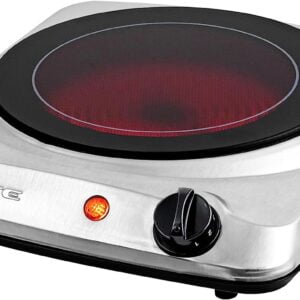Electric Cooktops
What are Electric Cooktops?
Electric cooktops, also known as electric hobs or stovetops, are cooking appliances designed to be installed on kitchen countertops or islands. Unlike traditional gas cooktops, electric cooktops rely on electricity to generate heat for cooking. They are available in various configurations, sizes, and designs, providing flexibility and convenience for different cooking preferences and kitchen layouts.
Types of Electric Cooktops:
Coil Electric Cooktops: These cooktops feature traditional coil burners made of metal. When the burner is turned on, electricity passes through the coils, generating heat. Coil cooktops are durable, easy to use, and usually more affordable compared to other types.
Smooth Glass-Ceramic Cooktops: Smooth glass-ceramic cooktops have a flat and seamless surface made of tempered glass. Beneath the glass, electric elements generate heat. These cooktops offer a sleek and modern appearance and are easier to clean compared to coil cooktops.
Induction Cooktops: Induction cooktops use electromagnetic fields to heat up compatible magnetic cookware directly. The cooktop surface itself remains relatively cool to the touch, as the heat is generated within the cookware. Induction technology provides rapid heating, precise temperature control, and high energy efficiency.
Advantages of Electric Cooktops:
Ease of Use: Electric cooktops are simple to operate. Just turn the knob or press a button to adjust the heat level.
Even Heating: Electric cooktops provide even heat distribution across the cooking surface, ensuring consistent cooking results.
Safety Features: Many electric cooktops come with safety features like indicator lights for hot burners, child lock controls, and automatic shut-off functions.
Easy to Clean: Smooth glass-ceramic cooktops offer a flat surface without crevices, making them easy to clean. Coil cooktops are also relatively straightforward to maintain.
Energy Efficiency (Induction): Induction cooktops are highly energy-efficient, as they heat the cookware directly and waste minimal heat.
Considerations When Choosing an Electric Cooktop:
Size and Configuration: Consider the size and layout of your kitchen to determine the ideal cooktop size and configuration. Cooktops are available in various widths and with different numbers of burners.
Power Levels and Heating Options: Check the power levels and heating options available on the cooktop. Some models have high-powered burners for quick boiling and lower-powered ones for simmering.
Compatibility with Cookware (Induction): If opting for an induction cooktop, ensure your cookware is induction-compatible. Magnetic cookware made of materials like cast iron or stainless steel is suitable for induction cooking.
Budget: Electric cooktops vary in price based on the type, brand, and features. Set a budget and look for cooktops that meet your cooking needs within that range.
In Conclusion:
Electric cooktops offer a convenient and versatile cooking solution for modern kitchens. Whether you prefer the traditional coil burners, the sleek design of smooth glass-ceramic surfaces, or the efficiency of induction technology, electric cooktops provide reliable and efficient heating for your culinary endeavors.
Consider your cooking requirements, kitchen space, and budget to choose the best electric cooktop that suits your needs and enhances your cooking experience.


